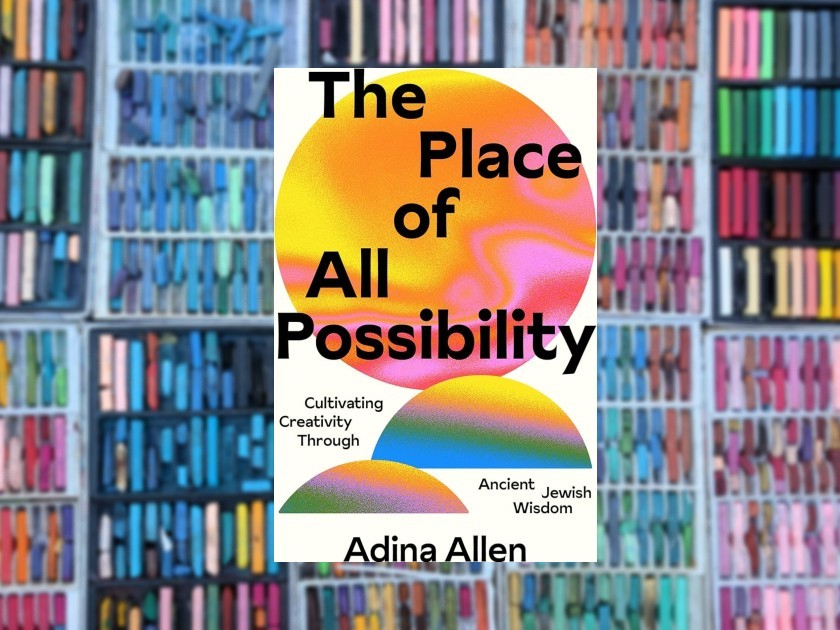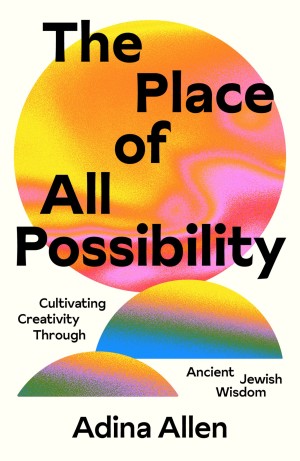
Created Creative
“In the beginning God created”
“God created humankind in God’s image”
God’s creative power is intimately linked to our own. In the first chapter of Genesis, we are given the beautiful, essential teaching that human beings are created betzelem Elohim — in the image of the Divine (Genesis 1:27). A common interpretation of this verse is that betzelem Elohim means that each human life is sacred. Every human life is to be cherished and respected. But there is more in this verse waiting to be uncovered. In order to understand what it may mean for us to be made in God’s image, first we must more deeply explore the nature of the Divine. There are many stories we could turn to to get a sense of who or what God is, and since God encompasses all, each would paint a slightly different picture, emphasizing different qualities and attributes. For our purposes, let’s go back to the very beginning of beginnings to explore how God is first portrayed in the Hebrew Bible.
The Torah opens with the words: “Beresheit bara Elohim et hashamayim ve’et ha’aretz.” “In the beginning, God created the heavens and the earth” (2 Genesis 1:1). Commentators across the generations have conjectured about why Torah begins with the creation of the world, and what meaning these verses might have to offer us in our own lives. While it may perhaps seem obvious that Torah should start with the beginning of creation, the renowned eleventh-century Jewish commentator Rabbi Shlomo Yitzchaki (commonly known by the acronym Rashi) doesn’t take this as a given. Rather, he wonders why the Torah doesn’t instead start with the commandments, the directives for how we’re meant to live in the world and relate to each other (Rashi on Genesis 1:1). For Rashi, Torah is primarily a book of laws and instructions for proper conduct. So, Rashi seems to be asking, why is it important to know how we got here? Isn’t it more essential to know how we ought to live, now that we’re here? Rashi answers his own question by saying that the Torah opens with this act of creativity to assert God’s ultimate power: to conceive of God as the creator of the cosmos is to know that God owns the world and everything in it, an idea that then sets the tone for how we read everything that follows.
But what if starting with God’s creation of the universe is less about asserting God’s power, and more about inviting us to access and activate our own creative potential? What if it’s about coming to understand our creativity as the way we build, shape, and imagine new realities and relationships? What if it is about helping us to know creativity as the most generative, dynamic, and potent aspect of being human — showing us that all possibilities are born from our innate creative potential? As this first verse of Genesis conveys, the God of the Torah is one who brings the world into being. Up until this point, the only thing we know about God is that God is creative. So, to say that we are made betzelem Elohim, in the divine image, is to say that we are fundamentally creative creations.
From beresheit bara Elohim, all else that follows — the creation of starlight and birdsong, soft grass and sweet nectar — comes from this initial act of creativity. The opening lines of Genesis continue, elaborating on the conditions of this first creative act: “The Earth was chaos and void with darkness on the surface of the deep and God’s breath hovering over the water” (Genesis 1:2). Isn’t this how all creative processes begin? We start in darkness, a state of not knowing, not yet understanding or being able to see clearly. There is chaos: jumbled confusion, questions, all that doesn’t yet make sense. And there is a void — an open space pulsing with energy. We start by hovering above the surface, that which is visible and known, as we gaze into the depths. And there is spirit — our own, God’s, both together — that begins to shimmer with aliveness as our curiosity is ignited and engaged. All creativity begins this way. Formed in the divine image, creativity is woven into the fabric of who we are. We are created creative. It is at the core of what it means to be human, and of how we connect to the Divine. To more deeply understand our own innate creativity and how we might draw on this power within us to shape the life and world we seek, we can look to God’s creative process in shaping the heavens and the earth.
______
As we continue to mine God’s creation of the world to glean insight for our own creative process, let us stay with this opening phrase of Torah to see what more might be uncovered in these initial words. Commonly translated as “in the beginning,” “beresheit” can be understood in myriad ways. Parsing this phrase, the “be” at the beginning is a conjugation that can mean “in,” “with,” or “by means of,” while the word “reisheit” means “first.” In addition to “in the beginning,” translators have interpreted this opening phrase of Torah to mean “with the beginning,” “by means of the first,” or “when God began.” One of my favorite interpretations of this line is from my friend, colleague, and teacher Rabbi Benay Lappe, which she shared when we were once studying this verse together: “With the first way of seeing or perceiving things, God created.”
Another way of saying this is: “With beginner’s mind, God created the world.” “Beginner’s mind” (known as “shoshin,” in Japanese) is a concept from Zen Buddhism that describes a certain openness and lack of preconceptions. In his book Zen Mind, Beginner’s Mind, Zen teacher Shunryū Suzuki describes it this way: “In the beginner’s mind there are many possibilities, [but] in the expert’s mind there are few” (Shunryū Suzuki, Zen Mind, Beginner’s Mind (New York: Weatherhill, 1970). To create from a place of beginner’s mind is to delight in not knowing, allowing ourselves to play, take risks, and be surprised by what emerges. Often thought of as a childlike state, to be in beginner’s mind is to drop any expectations of outcome, and with it, the shame and embarrassment that so often surface in adulthood, which can inhibit us from experimenting with something new, or even something familiar in a new way. To say that God created the world “with beginner’s mind” is to lift up an image of a playful, curious God who creates as a process of growth, discovery, and delight — thereby inviting us to do the same.
Pause for a moment and see if you can remember back to when you first heard of “God.” What image comes to mind? Chances are it’s not one of a playful, irreverent, curious deity. At best, most of us were offered images of God more in line with Rashi’s all-powerful master of the cosmos, which came along with the additional attributes of anger, remoteness, jealousy, and domination. This is an image of a God who violently carries out His will upon His subjects (it goes without saying that this image of God was always “He”). For this God, creation is a step-by-step series of commands enacted upon inert material. And if we believe that we are made in that image, we also might behave as domineering, dogmatic rulers on earth. Yet, as we’ve been exploring, this isn’t the only way to view God. Far from it. How might we understand the creation of the universe — and ourselves — differently if we imagine God as creating with beginner’s mind?
How might we understand the creation of the universe — and ourselves — differently if we imagine God as creating with beginner’s mind?
Jewish tradition teaches that “God spoke and the world came into being” (Psalms 33:9). And as we read in Genesis, “Vayomer Elohim yehi or,” “God said, ‘Let there be light,’ and there was light” (Genesis 1:3). Throughout the opening verses of Genesis, again and again, God says “vayehi,” “let there be,” referring to light, land, oceans, animals, peoples — and then there was. In the view of the all powerful master, God is a sole actor requiring no relationship or assistance in these successive stages of creation.
However, as we are created in the image of the Creative force itself, we can call forth other images of the Divine. When we look again at these verses with beginner’s mind, there is an opportunity for us to view this word “vayehi” from another vantage point. While the word “vayehi” can be interpreted as an order for something to exist (“there shall be”), this reading flattens the creative process and removes all relationality, nuance, and serendipity. This interpretation also excludes us from recognizing ourselves in this process of Creation. Outside of fairy tales and fantasy, no mortal creature can make a snap command that then immediately comes into being.
I want something more from the text — something that honors the aliveness of the world, that lifts up the interconnection between me and everything I touch in a mysterious but thrilling dance of creation. And if I want something more, why would God want anything less?
I imagine a God who approaches the raw elements of creation with a beginner’s mind, and allows previously imperceptible possibilities to reveal themselves. And indeed, when approached from a different angle, the very same text suggests the possibility of a God who creates from a place of openness and spontaneity — with a beginner’s mind. Rather than a command given from on high, what if instead we read “vayehi” the way we might in English, as an affirmation of what is, or even as a reverent blessing laced with delight. What if instead of a directive “let there be!” God’s “vayehi” is simply an act of letting it be — noticing and welcoming the articulation and formation of a new reality as it emerges? We might imagine God “fluttering over the face of the deep,” as the text says, noticing flickers of light amid the darkness, like phytoplankton glowing in the inky sea at night. God beholds what is, the glimmers that are appearing on their own, and in a dance of call and response, welcomes them to come more fully into existence: “Vayehi — let it be.”
Surprised and delighted by what has arisen, God pauses to appreciate the various phases and fruits of the cosmic creative process, exclaiming again and again: “Ki tov — it is good.” In our own creative process, what does it mean for something to be “good”? Often this word is used to designate a judgment by a recognized authority: teachers, art critics, parents, and peers. The accolade of “good” is most often used to describe the final product, while the process of creating is often hidden from sight.
In this rereading, however, God creates with a beginner’s mind, which privileges process over final product. Spontaneous, improvisational, open, and receptive. This is the creative process that we can access at any moment. When we, like God, are able to approach the elements present in our lives with a beginner’s mind, we become aware of the inherent goodness and aliveness in all things, and notice that they engage us in a collaborative call and response. Ki tov — it is good to see things fresh, to welcome new interpretations, to let what is emerging reveal itself, and to witness the perpetual motion of our creative process with joy and reverence.



